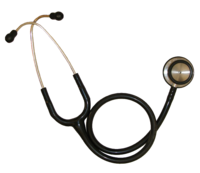
Photo from wikipedia
Background: Autonomic dysfunction (AD) is infrequently evaluated preoperatively despite having profound perioperative implications. The ANSiscope™ is a monitoring device that quantifies AD. This study aims to determine the potential of… Click to show full abstract
Background: Autonomic dysfunction (AD) is infrequently evaluated preoperatively despite having profound perioperative implications. The ANSiscope™ is a monitoring device that quantifies AD. This study aims to determine the potential of the device to predict hypotension following anesthetic induction, occurrence of arrhythmias, and inotrope requirement for patients undergoing off-pump coronary artery bypass surgery (OPCAB). Study Design: Prospective observational double-blinded study. Materials and Methodology: Seventy-five patients undergoing OPCAB had their autonomic function assessed by ANSiscope™. They were classified into four groups based on their AD and compared to perioperative adverse events. Results: Patients with diabetes had a higher ANSindex (P = 0.0263). They had a greater decrease in systolic blood pressure (P = 0.001) and mean arterial pressure (P = 0.004) postinduction, had an increased incidence of arrhythmias (P = 0.009), required higher inotropic support immediately (P = 0.010) and at 24 h after surgery (P = 0.018), and longer duration of postoperative ventilation (P < 0.001). They also had a higher incidence of emergency conversion of OPCAB to on-pump surgery (P = 0.009). Conclusions: An increased association between AD as quantified by the ANSiscope™ and perioperative adverse outcomes was observed. An increased rate of emergency conversion of OPCAB to on-pump surgery with higher dysfunction was noted. The authors opine that the threshold for conversion must be lower in patients deemed to be at a higher risk. Proper evaluation of the autonomic nervous system empowers the anesthesiologist to anticipate and adequately prepare for complications.
Journal Title: Annals of Cardiac Anaesthesia
Year Published: 2019
Link to full text (if available)
Share on Social Media: Sign Up to like & get
recommendations!